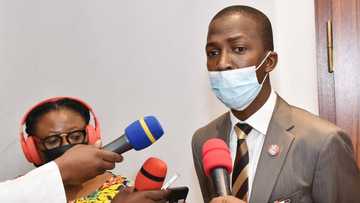Banks Might Stop Collecting Bad Naira Notes From Nigerians as CBN Places N400 Fine for Every N100 Deposits
- Nigerians will have to find a way to dispose of their bad naira notes as CBN has instructed banks to stop or get fined
- CBN also warned that should banks default and put the bad notes as part of their deposits a fine of N400 will be applicable to every N100
- In five years, CBN spent N3.88 billion to destroy over N4.13 trillion worth of dirty currencies deposited by commercial banks
PAY ATTENTION: Click “See First” under the “Following” tab to see Legit.ng News on your Facebook News Feed!
The Central Bank of Nigeria (CBN) has directed Deposit Money Banks (DMB) to stop including mutilated notes as part of their deposits.
The stop this huge cost, Ahmed Umar, director, currency operations department of CBN, in Abuja, said this in a circular issued over the weekend warned banks will now pay a fine of N400 for every N100 mutilated dirty notes.
According to the circular, the directive took effect from April 1.

Source: Getty Images
What he is saying
Umar said that the existence of such banknotes in the economy falsified the true value of the currency in circulation.
PAY ATTENTION: Follow us on Instagram - get the most important news directly in your favourite app!
He added that it could also be a channel for fraudulent activities.
He said that henceforth, composed banknotes discovered in the deposit of DMBs shall attract a penalty of 400 per cent of the value.
In his words:
“The management of the CBN observed with concern the increase number of composed banknotes deposited by DMBs and request for replacement of such banknotes by members of the public,” CBN said.
“The existence of composed banknotes in the economy falsify the true value of currency in circulation, and can also be avenue for fraudulent activities.
“Consequently, any composed banknote discovered in the deposit of DMBs shall attract penalty of 400 percent of the value.”
Role of CBN currency circulation
CBN on its website noted that currency is issued to Deposit Money Banks (DMBs) through the branches of the CBN and unfit notes are retrieved through the same channel.
Currency deposited in the CBN by the DMBs is processed and sorted into fit and unfit notes in line with the Clean Notes Policy. The fit banknotes are re-issued, while the unfit ones are disposed of.
Cost of currency disposal
CBN in its Annual Report 2020 as compiled by Currency Operations Department revealed how destroying mutilated banknotes cost the country N3.5 billion from 2016 to 2020.

Source: Facebook
CBN reacts
Providing insight on the new directive when contacted by Legit.ng, Osita Nwanisobi the director of its corporate communications department the Central Bank of Nigeria explained that the directive was necessary given the increasing number of mutilated banknotes deposited by Nigerians.
Ecobank leads as 10 commercial banks spend over N400bn on staff salaries
Meanwhile, Legit.ng had earlier reported that working in the banking industry is a dream for many Nigerian graduates because they believe there is a lot of money to be made
The report showed how ten commercial banks paid workers salaries and wages of over N400 billion in 2021.
The amount captured in the report only covers salaries and wages and does not include other staff costs, or pension contribution that makes up personnel cost.
Source: Legit.ng




